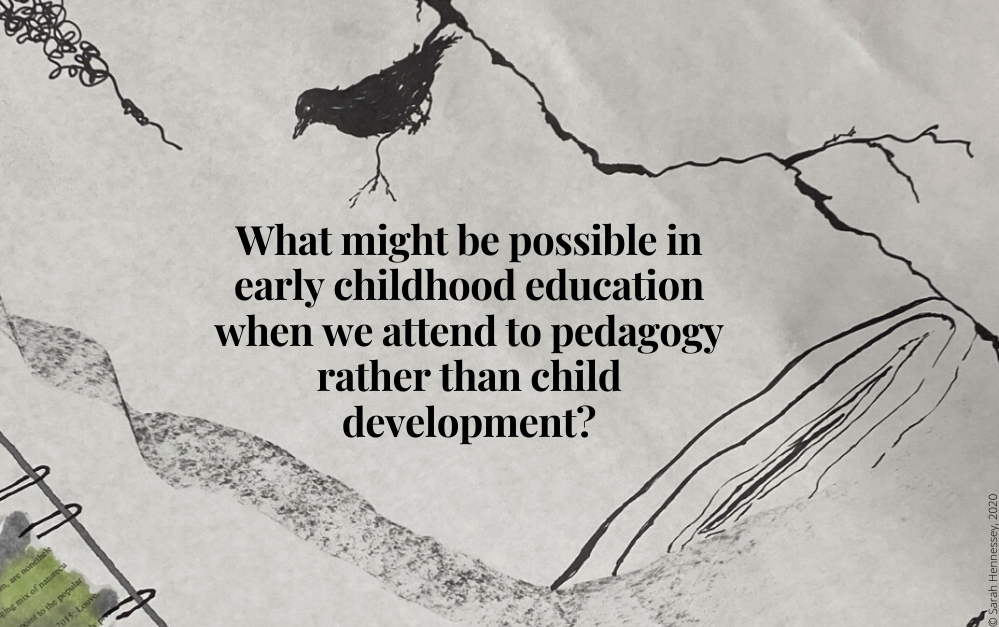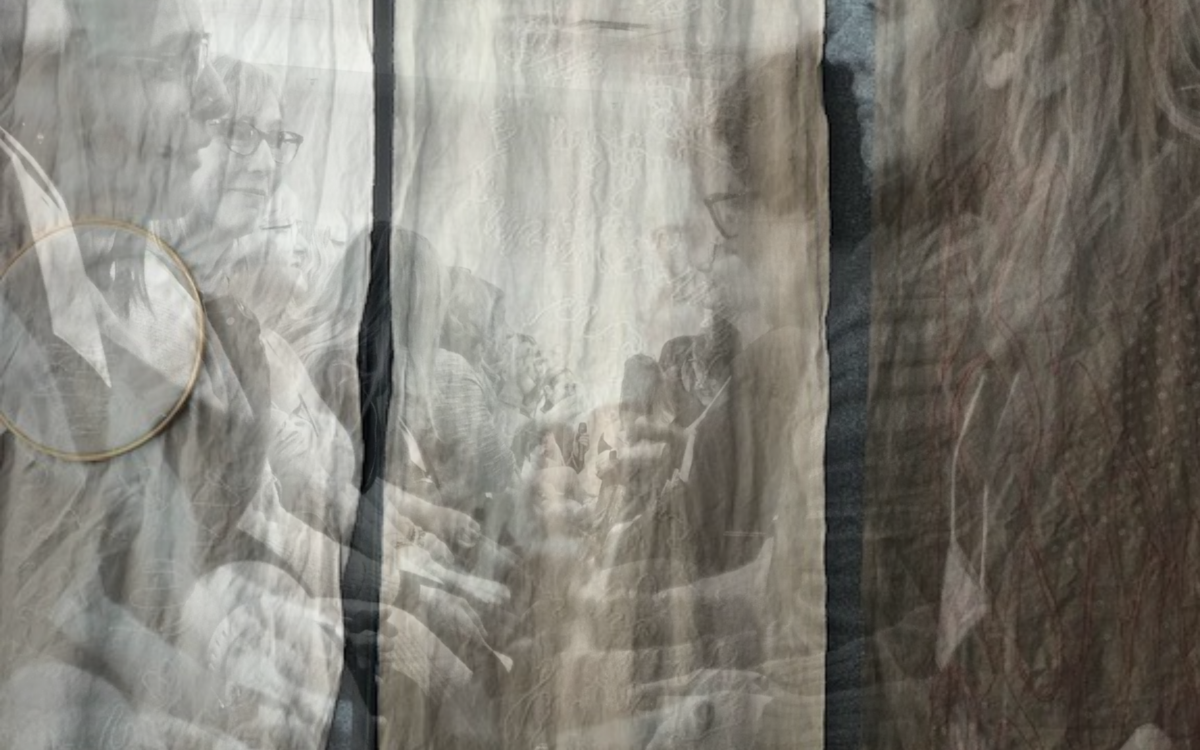Cristina Delgado Vintimilla (CDV): This interview takes place in the midst of two projects that you are leading in early childhood education in Canada. Both projects inaugurate the professional figure of the pedagogist. This figure responds, among other things, to the growing interest to think about early childhood education as a pedagogical project. Indeed, the term pedagogist connotes an intimate connection with pedagogy. As these projects unfold, we have experienced that, thinking about pedagogy and engaging early childhood education as a pedagogical project is a complex endeavor. What intrigues you about this project and why is it important to you? I imagine we can think of this encounter between pedagogy and early childhood in many ways. What comes to mind for you and what are their challenges and opportunities based on your view of the work, so far?
Veronica Pacini-Ketchabaw (VPK): Thank you for these questions Cristina. Let me begin by clarifying that the two projects that you are referring to are the ECPN (Early Childhood Pedagogies Network) and the PNO (Pedagogists Network of Ontario). What is important for me is that these two projects, as you said, insist that early childhood education needs to engage in pedagogical conversations, and in doing so challenge the pervasive developmental discourse that early childhood education continues to perpetuate. I don’t think that I need to say too much about why these projects aim to bring alternative narratives into early childhood. As Peter Moss and Gunilla Dahlberg reminded us more than a decade ago, developmental psychology as a dominant discourse allows for early childhood education to be constructed as a service for families and as a producer of predetermined outcomes. Like these authors do, the projects that you mentioned are proposing that we think about early childhood education as a “public forum situated in civil society in which children and adults participate together in projects of social, cultural, political and economic significance” (p. 73). What intrigues me is how the role of the pedagogist might allow us to open up these kinds of conversations in early childhood education. What might be possible in early childhood education when we attend to pedagogy rather than child development? Of course there are multiple challenges. The main challenge is that Canada might not yet be ready to have this conversation. Engagements with pedagogical thought require that Canadian early childhood education invents another vocabulary… Yet, I continue to encounter (especially now during the pandemic when early childhood education has been a conversation in the media and political circles) troubling references such as ‘early childhood education as an essential service’, educators as ‘workers’ and members of the ‘workforce,’ and the field as a ‘sector’. This factory-like lexicon creates certain expectations and moves us away from engaging in early childhood education as a cultural and political project.

(CDV): As I am listening to you, and I think about early childhood as a cultural project, I think about the tension between, on one hand, education as a system that perpetuates particular structures of interpretation and socializes children into a stabilized state of affairs, and on the other hand, education as what creates the conditions for thinking otherwise futures and for inserting something different into the present. This, seems to me, to be the tension that you are describing. I would propose that this is a tension that is becoming acutely present as a provocation that pedagogy brings to early childhood education. In your view, what might early childhood education in Canada need to consider to generatively respond to such provocation? Particularly when considering that– in the broad social imaginary– early childhood is thought in such constraining and instrumental ways as those described in your example?
VPK: Yes, that is the tension that pedagogy offers to early childhood education. There are many things we need to consider. The main (amongst many) that comes to mind right now is how to work with pedagogists in creating the conditions for thinking otherwise futures. I often worry that this side of the tension is completely dismissed. Somehow we have had opportunities to engage in the critique of hegemonic structures within early childhood education. In my experience, we have become quite skillful at unpacking and unsettling discourses with pedagogists. The challenge now is to work with pedagogists to create conditions for other futures. I am thinking about the pedagogical work that we have been doing in the Common Worlds Research Collective. I have learned so much through my work with you and other fabulous colleagues to challenge myself to dive into the question ‘what could be otherwise?’ I think it is important that pedagogists do not become too comfortable with critiquing educators’ practices. I am not saying that critique doesn’t have a place in the life of a pedagogist. It does. But critique needs to be deeply entangled with the ‘otherwise’, the ‘what if’, the ‘yet to come’. I want to stress the idea that these two movements are indeed entangled. One does not come after the other. Like you said Cristina, it is a tension that as pedagogists we need to constantly live in.
CDV: Indeed, generative tensions need to be cultivated in early childhood education and this is not because early childhood education lacks tensions, but because the tendency might be to ‘master’ and even try to avoid those tensions in the name of protecting what we already know or the familiar ‘how to’ that mark early childhood in Canada. What do you think might be some of the conditions and dispositions that a pedogist needs to nurture as a way to move past mere critique? And could you share some thoughts about how it would look like if early childhood practices and curricular propositions were driven by the generative force of the “what if”? I am particularly interested in this last question because I think that thinking “what if” or the “yet to come” requires much of our attention. As a pedagogista, I consider thinking “what if” as a complicated and demanding mode of engagement with the world. “What if” is at the heart of what I refer to as ideation which, as you know, it is one of the abilities that defines the work of a pedagogista, in the Italian tradition.
VPK: As you know, we started to think about some of the conditions that a pedagogist needs to nurture in an article that was just published in Contemporaries Issues in Early Childhood. Let me address just one here. In my work with pedagogists in the PNO and ECPN, I have come to realize that interdisciplinarity is one of those conditions that a pedagogist cannot live without. By that I mean that a pedagogist has to be able to attend to the conditions of early childhood education not only by drawing from a multitude of disciplines (anthropology, sociology, geography and so on) but also be able to encounter these conditions through different theoretical frameworks. A pedagogist thinks with poststructuralism, feminist Black studies, and/or feminist Indigenous theorizings to challenge the narrow discourse of child development that organizes early childhood education. Phenomenology is a language that a pedagogist thinks pedagogical documentation with. Feminist environmental writings help a pedagogist to think early childhood education in viral times. Yet, it is not about moving in and out of disciplines and theoretical frameworks. It is about working transversally with multiple languages. These languages intermix so that the pedagogist can offer educational proposals that move beyond the monopoly of developmentally appropriate activities.
To address the second part of your question: I agree that the ‘what if’ requires careful attention in the education of pedagogists (and early childhood education as a whole). Early childhood education suffers from literalism. We lack imagination of what might be possible. This is dangerous because pedagogy needs to be able to think ‘the otherwise’ in order to avoid being squeezed into neoliberal capitalism. A pedagogist needs to embrace what Loris Malaguzzi called creativity (not psychologically defined). I think I want to think about this disposition as speculative practice – that is, a practice that is committed to an idea of worlding that keeps the world going in more-just-ways. I might even say that what makes a pedagogist is to be able to embrace the ‘what if’. Yes to the idea of ideation, of invention, of creative projection!
When sharing this piece, please include the following citation: Pacini-Ketchabaw, V., & Delgado, C.V. (December 2020). On early childhood education encountering pedagogy: An interview with Veronica Pacini-Ketchabaw. Pedagogist Network of Ontario Magazine, 1(1). Retrieved from https://pedagogistnetworkontario.com/on-early-childhood-education-encountering-pedagogy-an-interview-with-veronica-pacini-ketchabaw/




